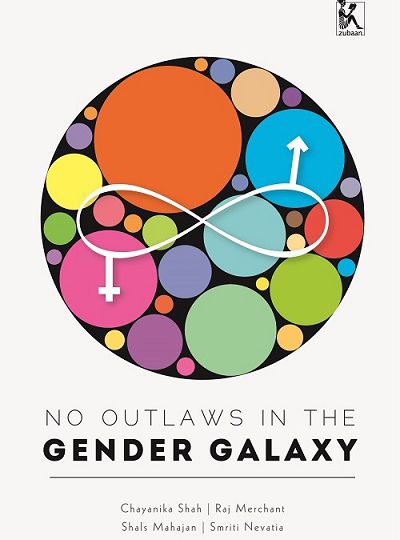
In 2009, LABIA began a research study that attempted to understand more about gender through the lives of queer persons assigned gender female at birth (PAGFB). In July 2015, Zubaan published No Outlaws in the Gender Galaxy, based on the study. This book explores how gender plays out in public and private institutions like family, educational institutions, work and public spaces. It illustrates the multiplicity of ways in which people live gender and testifies that even if there are gender laws, in a just world there can be no gender outlaw. We give below an excerpt from the book.
The names of our respondents are all changed. While all our respondents were assigned female at birth, their present gender identity was not necessarily ‘woman’. The names and pronouns that we use for them reflect their gender identity when the interviews were taken.
Location Matters
A significant number of respondents said how it was impossible to live the way they wanted in their hometown or village. Transgressions from the norm were quickly picked up and pointed out in closely knit semi-urban and/or rural areas. Some reported being called names or being discriminated against while growing up. One person attested, ‘In Tamil they used to call me pondi-chati—it means you are born neither a male nor a female.’ Knowing everyone in the village or neighbourhood means that people who do not live normative lives are acutely visible and vulnerable.
Jai, who identifies as ‘man’, recounted that there was someone in the next village who was PAGFB and lived as a man. Jai never managed to speak to this person, who was a daily wage labourer and by and large ostracized by everyone. However, there was one incident. ‘He came up to my father and spoke a bit and after he left, my father said, “Such persons are wrong and should be tied and beaten and killed. She should be thrown in the fire.” So I got scared.’ Jai was afraid he too would be seen as ‘one such person’.
Kirti can never break some codes where he lives:
Having lived in the village all my life and worn saris, it is hard to imagine what I would look like if not in a sari. And I would have short hair if I had a choice. I would have smoked and drunk more freely…. Once [my partner] and I tried to smoke inside the house, but people from outside wondered about the smell. So we stopped and haven’t done it again.
While Kirti cannot break these rules due to fear of verbal or physical persecution, there were instances where people contravened such norms openly. When Divakar migrated to the city, its anonymity meant that he had no problems passing as male. This holds him in good stead when he returns to visit his natal family in the village where he was raised as a girl: ‘In front of known people I try and walk with as much confidence as I can. I walk in my village with one shirt button open.’ Now, after having reclaimed his space in this way, Divakar is not afraid go anywhere, any time.
Others also experienced migration as liberating, as the influence of social and familial controls was diminished. Sara recalled, ‘My father said do what you want to do in [the big city], not in [this town].’ She moved to the nearest big city when she was 15, and now says, ‘I will never get the same sort of freedoms as I do living alone if I went back home.’
The privilege of an urban location, which for many was also a space away from home, enabled our respondents to take up space in male-dominated areas, cut their hair, wear shirts and trousers, as well as walk and talk differently. Quite a few mentioned that the very first thing they did after running away from home was to get their hair cut short. Such as Sam, who was living on the streets after leaving home. Today, he can confidently access barbers who cater to a male clientele. Another respondent said, ‘The first time the barber… looked at me with doubts. He could not question me, as I was his customer. Now that I am a regular, they do not say anything.’
It is not just the people who are gender transgressive who experience freedom in anonymous urban environments; these sites allow gender-conforming people to break norms too. Laxmi, who migrated from her village to a large city, said, ‘I have more freedom to move around. I have the freedom to dress in jeans.’ The city has been vastly empowering for her and she faces no problems there, whereas even now, when she visits her village, she is subjected to comments and censure from not just neighbours, but also her own friends.
While relatively anonymous urban spaces allow some room for negotiation, not all spaces can be as easily accessed or used by PAGFB as they can be by cismen. Spaces that most respondents felt safe accessing were homes and other private spaces, as well as semi-public spaces like coffee shops and malls. However, class privilege and the ability to spend are significant enablers for access to the latter.